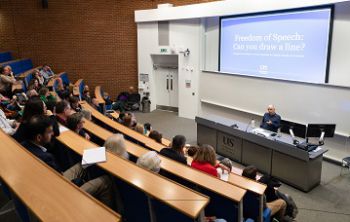Freedom of speech in focus with recent lecture and blog from David Ruebain
Posted on behalf of: Internal Communications
Last updated: Thursday, 7 December 2023

David Ruebain delivering his lecture on campus
In November, Professor David Ruebain, Pro-Vice-Chancellor (Culture, Equality and Inclusion) and Free Speech Officer for the University, explored freedom of speech and its boundaries in a lecture on campus for the University community. David also published a blog on the Advance HE website as part of a series on academic freedom, freedom of speech and equality, diversity and inclusion (EDI).
The lecture, titled ‘Freedom of speech – can you draw a line?’, was previously given as the first in a series at King's College London in October.
You can read highlights below and listen to the replay on SoundCloud.
The critical importance of free speech in universities
Highlighting free speech as the “cornerstone of scholarly inquiry and research and also of our responsibility to educate and enlighten” during the lecture, David emphasised that evident difficulties and dilemmas do not detract from its central role in the life of universities.
Speaking of his role, he said: “I have responsibility for advancing speech, free speech, as well as Equality, Diversity and Inclusion and broader cultural issues. I'm committed to each of them and, on occasion where there may be actual or purported conflict between or indeed within these commitments, I seek to reconcile without subsuming one under the other.”
What is and what isn't lawful free speech?
David noted that “there is no consistent legal definition of hate speech” and in respect of that and of harassment, that “Universities and others have to make decisions based not only on the available facts, but also the specific context on a case-by-case basis”.
Talking through examples concerning external speakers on campuses, he noted that “there are complexities ... which do not easily lend themselves to rigid legal or regulatory solutions” but also that “contestation regarding what is and what isn't lawful free speech isn't confined to universities”.
Implications for Equality, Diversity and Inclusion initiatives
Regarding equality, diversity and inclusion he said: “it is right to ensure that EDI and any initiatives do not conflict with other obligations” but that “there is a strong rationale for institutional programmes such as Athena Swan, the Race Equality Charter, or indeed the government's Disability Confident scheme”, which “can have a role in preventing discrimination and harassment”.
Using listening skills to navigate contested issues
David spoke about “navigating a course that respects and complies with all obligations, but which looks beyond the law for possible solutions to contested issues”, adding that “information, understanding, community building and a range of other tools” are needed.
Highlighting listening as a vital skill in this process, which the University supports through its Open Listening Programme, David said such sessions can seek “to enable staff and students to engage with difficult conversations in alternative and constructive ways”. They can also be useful in “developing and maintaining supportive relationships across different life experiences and identities”.
David concluded: “Ultimately, the aim is to welcome and embrace diversity, not only in the EDI sense of background, identity and belief, but also of thought, method and discipline. That is not easy or straightforward, but it is necessary and requires thoughtful understanding of complex relations”.

